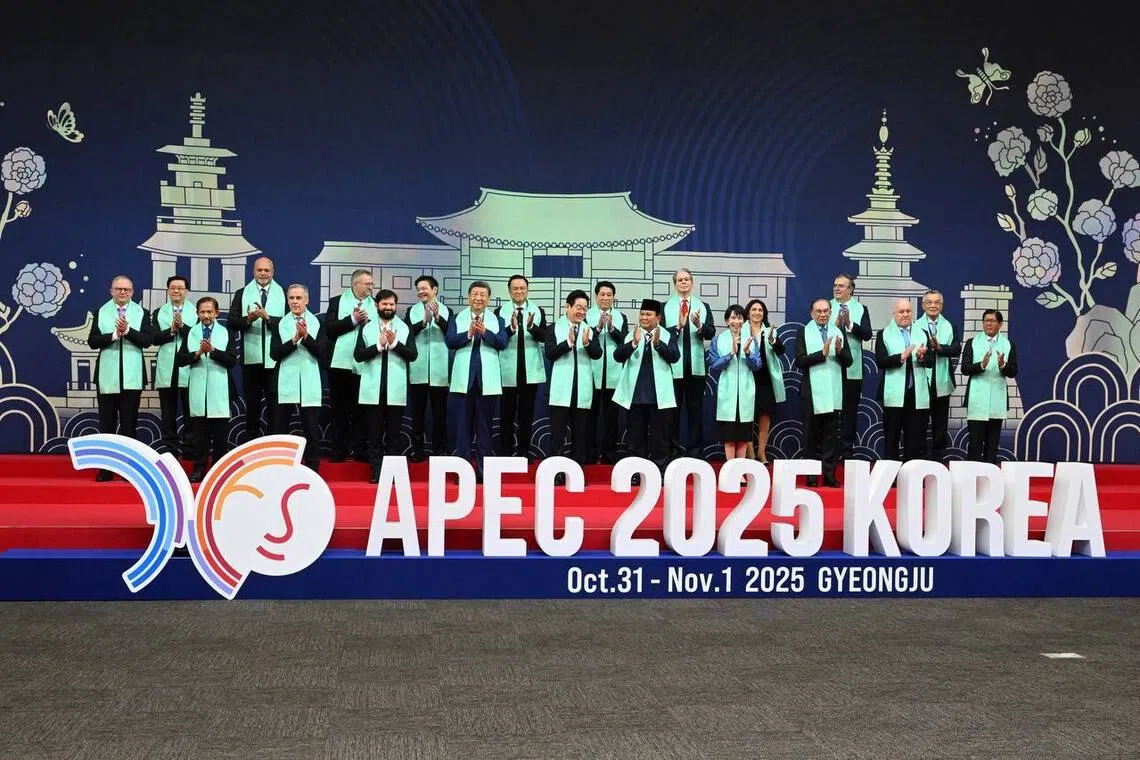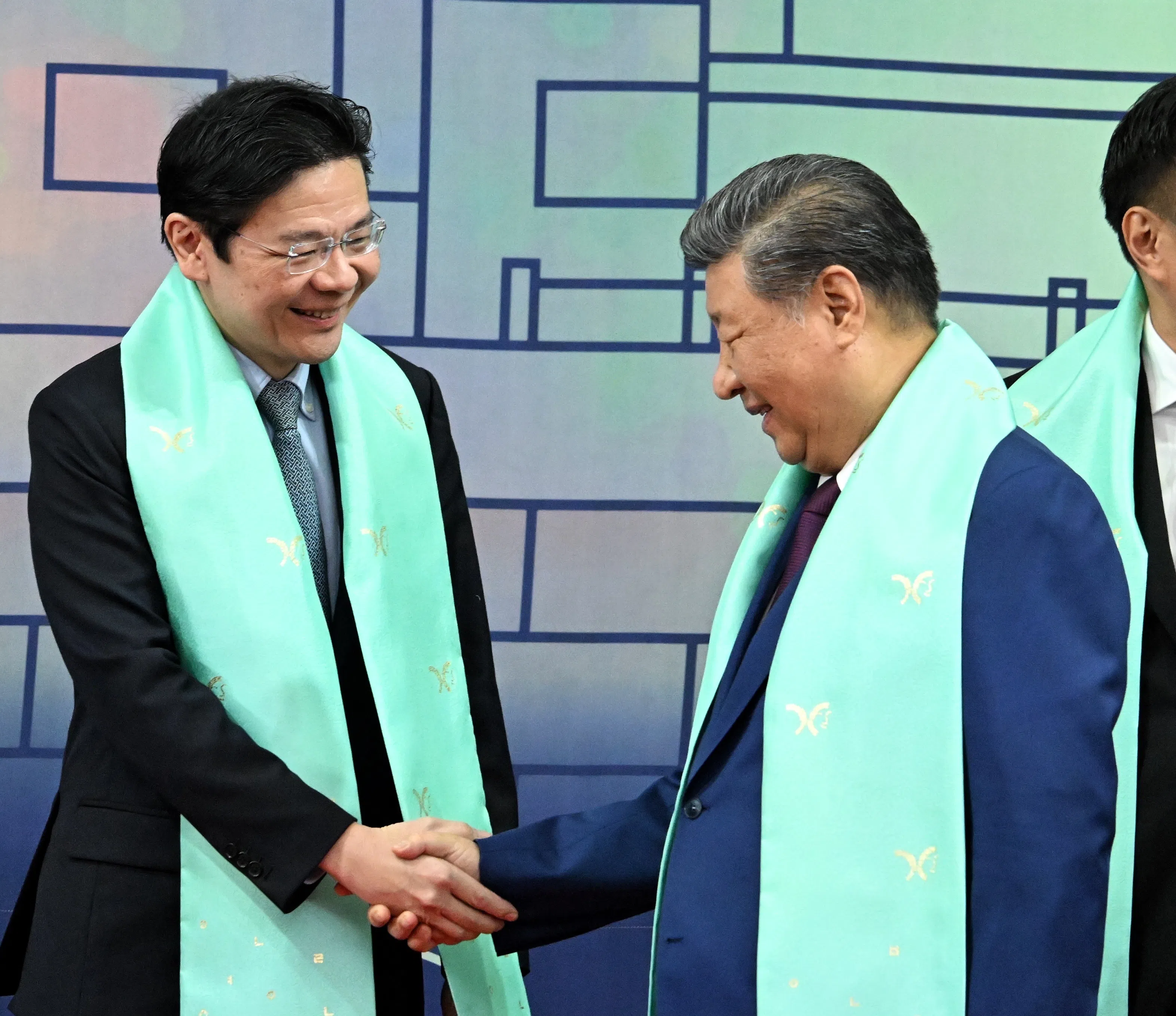GYEONGJU, South Korea – The trend towards more global economic fragmentation will most likely continue after a “temporary truce” between the US and China, but the rest of the world still has agency, said Prime Minister Lawrence Wong.
Singapore and other countries are not passive bystanders, he told the local media after the conclusion of the annual Asia-Pacific Economic Cooperation (Apec) summit on Nov 1.
Likening economic fragmentation to global warming, PM Wong said: “We know it’s happening, but we can take actions to mitigate.
“And likewise, if countries are able to do more like what we did this time with the Apec summit and through other areas of cooperation, if we can all take action together, then we can do something about these structural trends.”
PM Wong was commenting on the Oct 30 meeting
on the sidelines of Apec which resulted in concessions from both sides on key trade issues such as rare earths and soya beans.
Describing it as a relief that the meeting took place, PM Wong said some much-needed and welcome guard rails have been placed around the relationship, providing some short-term predictability.
But the US and China’s rivalry is likely to continue, and fundamental underlying issues have not been resolved, he said. Mutual suspicion, distrust and attempts to insulate themselves from each other will continue.
In this environment, other economies still have the agency to push frontiers and harmonise standards, said PM Wong, who is also Finance Minister.
He raised the example of
– a green trade pact which Singapore, Chile and New Zealand had launched negotiations for on the sidelines of the summit.
Pacts like these have a lot of value because it is easier for like-minded, small, trade-dependent economies to set new standards and facilitate more economic flows, he said.
“Then others see it, hopefully others get a little bit of Fomo (fear of missing out), and they say: ‘I want to join in too’,” he said.
This process is not just theoretical, PM Wong said, citing how Singapore, along with Brunei, Chile and New Zealand, started the P4 agreement in the past that eventually evolved into
which now has 12 members, including Japan, the United Kingdom, Canada and Mexico.
“You see countries applying to join because they see value in it, and we hope to do the same for the Gepa now, with regard to the green economy,” he added.
More trade and more investments will lead to better jobs for Singaporeans, he said.
“That’s the tangible benefits from trade, but trade also has a lot of intangible benefits,” he said, adding that these include the exchange of ideas and more cultural exchange, which Singaporeans also benefit from.
Language around trade has changed in recent years, and economic, supply chain and technology security have become increasingly important – meaning that more barriers are put up against trade, he said.
But the 2025 Apec summit has been beneficial because it has resulted in a consensus which is still generally pro-trade, said PM Wong.
Following the summit, the leaders of the 21 Apec member economies, including Singapore, issued the Gyeongju Declaration, which reaffirmed their commitment to strengthening cooperation and concrete actions to enable economic growth that benefits all.
This is important for Singapore as it is a trade-dependent economy, PM Wong added. “Trade is not just good to have for us. Trade is our lifeblood. Trade is existential for us.”
Singapore must therefore continue to support Apec and the momentum towards trade and trade liberalisation. This means multiple lines of work, including reforming the World Trade Organisation (WTO) and bringing different regional groupings closer together, PM Wong said.
He spoke about reforming the WTO on Oct 31 at the Apec Economic Leaders’ Meeting, the highest-level meeting at the annual summit.
He said then that the collective leadership of Apec’s economies is needed to reform and strengthen the 30-year-old trade body so that it stays effective and relevant.

Singapore has to be realistic about the challenges of such reforms but cannot afford to give up trying, PM Wong said on Nov 1.
“We have to keep pushing at this and do our very best to achieve reforms, even if the trajectory may not always move in a linear fashion,” he said.
“Sometimes it’s up and down, sometimes it may curve and bend, but over a period of time, as long as we are moving forward in the right direction, I think that’s already an achievement.”
Singapore will continue to do so not just by itself but with like-minded countries like small and medium-sized trade-dependent economies, he said.
Some of the new initiatives can improve trade flows, said PM Wong, noting that there are still differing standards around some very basic things. “What is a carbon credit? The rules may be different from one country to another. What do you mean by sustainable fuel? Different countries have different definitions.”
These differences are bad for business and make it hard for companies to operate between countries, he said.
Countries converging around agreed standards reduces compliance and helps to facilitate more trade and investment.
China is slated to hold the Apec summit in Shenzhen in 2026, while Singapore will host it in 2030.

During his four-day stint in Gyeongju, PM Wong also met other heads of government over dinners and had bilateral meetings with his counterparts.
He attended
, and also met US Treasury Secretary Scott Bessent.
Asked about his discussions with them, PM Wong said he did not get into specifics on trade with Mr Trump.
But it is clear that the US would like to see trade continuing with its partners, with some rebalancing, PM Wong said.
With Mr Bessent, they discussed tax policies and cooperation around actions against organised crime, with a brief mention on trade where he gave an update on Singapore’s positions.
“Hopefully he will update and share that with his colleagues in the government too, and we can continue to make progress on our trade negotiations,” PM Wong said.
Deputy Prime Minister Gan Kim Yong has been leading negotiations on the possibility of a cap on the tariff rate, similar to those negotiated in the US’ trade deals with Japan and the European Union.
On how these engagements at the Apec and Asean summits will affect the economy, PM Wong said it is hard to predict near-term economic changes.
Over the broader horizon, the external environment will be less hospitable and Singapore will have to brace itself for a different way of operating. There will be more barriers to trade, more uncertainty and more competition for investments, he said.
While Singapore wants its economy to grow, growth by gross domestic product alone is not sufficient.
He said: “We must also ensure that the growth is based on innovation, productivity, high-quality growth, and then ultimately that benefits Singaporeans across the board. And that means we have to ensure that growth leads to more jobs, better jobs and higher incomes for everyone.”
PM Wong will head to Seoul from Nov 1 to 2 for an official visit at the invitation of the South Korean President.
